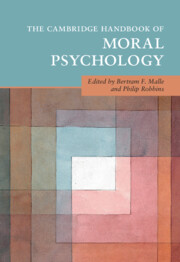Book contents
- The Cambridge Handbook of Moral Psychology
- Cambridge Handbooks in Psychology
- The Cambridge Handbook of Moral Psychology
- Copyright page
- Contents
- Figures
- Tables
- Contributors
- Preface
- 1 Modern Moral Psychology
- Part I Building Blocks
- Part II Thinking and Feeling
- Part III Behavior
- Part IV Origins, Development, and Variation
- Part V Applications and Extensions
- 21 Criminal Law, Intuitive Blame, and Moral Character
- 22 Moral Dimensions of Political Attitudes and Behavior
- 23 Moral and Religious Systems
- 24 Lessons from Moral Psychology for Moral Philosophy
- Index
- References
24 - Lessons from Moral Psychology for Moral Philosophy
from Part V - Applications and Extensions
Published online by Cambridge University Press: 20 February 2025
- The Cambridge Handbook of Moral Psychology
- Cambridge Handbooks in Psychology
- The Cambridge Handbook of Moral Psychology
- Copyright page
- Contents
- Figures
- Tables
- Contributors
- Preface
- 1 Modern Moral Psychology
- Part I Building Blocks
- Part II Thinking and Feeling
- Part III Behavior
- Part IV Origins, Development, and Variation
- Part V Applications and Extensions
- 21 Criminal Law, Intuitive Blame, and Moral Character
- 22 Moral Dimensions of Political Attitudes and Behavior
- 23 Moral and Religious Systems
- 24 Lessons from Moral Psychology for Moral Philosophy
- Index
- References
Summary
This chapter of the handbook suggests some lessons from moral psychology for ethics and metaethics. The authors note that empirical research on a wide range of topics, including moral character, happiness and well-being, free will and moral responsibility, and moral judgment, has had a profound influence on recent philosophical theorizing about the foundations of morality. In their chapter they focus on one issue of particular importance: the reliability and trustworthiness of moral judgment. They critically assess three lines of argument that threaten to undermine epistemic confidence in our moral judgments, namely process debunking arguments, arguments from disagreement, and arguments from irrelevant influences. Though the jury is still out on how successful these arguments are, there is little question that they have potentially profound implications both for moral epistemology and philosophical methodology. Perhaps the most important lesson for ethics and metaethics to be drawn from moral psychology, then, may be that future progress in moral philosophy is likely to depend on philosophers and psychologists working together, rather than in isolation from one another.
- Type
- Chapter
- Information
- The Cambridge Handbook of Moral Psychology , pp. 596 - 620Publisher: Cambridge University PressPrint publication year: 2025

